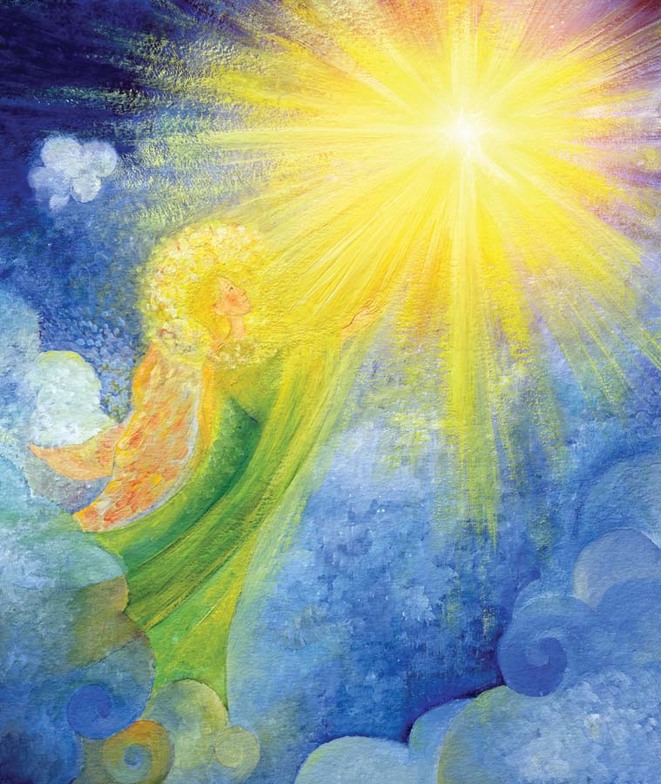
(Bishop Melissa Skelton's Christmas message published in the December 2016 issue of Topic, the publication of the diocese, delivered as a section of the national Anglican publication, The Anglican Journal)
Isaiah 9:2-7
The people who walked in darkness have seen a great light; those who lived in a land of deep darkness-- on them light has shined. You have multiplied the nation, you have increased its joy; they rejoice before you as with joy at the harvest, as people exult when dividing plunder. For the yoke of their burden, and the bar across their shoulders, the rod of their oppressor, you have broken as on the day of Midian. For all the boots of the tramping warriors and all the garments rolled in blood shall be burned as fuel for the fire. For a child has been born for us, a son given to us; authority rests upon his shoulders; and he is named Wonderful Counselor, Mighty God, Everlasting Father, Prince of Peace. His authority shall grow continually, and there shall be endless peace for the throne of David and his kingdom. He will establish and uphold it with justice and with righteousness from this time onward and forevermore. The zeal of the Lord of hosts will do this.
As I write this to you the whole world, it seems, is both bone weary and in suspense about the US elections. While I had never expected that we here in Canada would be so intrigued by what goes on south of the border, I now have a new appreciation for just how rightfully sensitive we are both to the events and issues that emerge in the US and to the tone of the discourse there.
And so many of us here have been deeply troubled by both the happenings and the discussions about race, sex, gender, refugees, money and power (to name a few!) in the news. In and around all these happenings many of us have found ourselves asking: “What really matters to me? How do I see myself in relationship to others? What behavioural standards do I expect of myself and others?
The people during the time of the prophet known as First Isaiah were struggling with these same issues in an even more intense way. Victims of a foreign invasion and dismayed by a faithless king, Isaiah’s audience was discouraged and deeply worried about their future in that all that they held dear appeared to be in jeopardy. And so Isaiah speaks as those who “walk in darkness” and who live “in a land of deep darkness.” Isaiah speaks of a people living under a burdensome yoke and the rod of oppression.
This language of darkness speaks to me as we make our way through days that have less and less daylight in them and as we live in a time when we wonder whether the light will be overcome by the darkness in some places in our world.
Into this kind of darkness and into times such as ours, the words of Isaiah proclaiming the presence of light, the gift of a child, a vulnerable one, come as a kind of wondrous salve. For his words speak into the tendency toward numbed-out grief, the tendency toward cynicism and withdrawal, the tendency toward a kind of ossified righteousness we can develop in response to a world where the darkness feels threatening. Instead of these responses, Isaiah proposes a world in which we continue to trust God’s recreation of light and in which we continue to respond to God’s gift of a child, the image of vulnerable humanity, with an answering vulnerable humanity of our own.
And so this is what Christmas is all about. It is about a trustworthy God who does not abandon us to the dark and who will not allow us to come to some final conclusion about the state of the affairs of the world in response to our particular experience of the darkness. Rather, in the coming of the Holy Child that is Jesus, God gives us the gift of a light that overcomes every darkness and the gift of the incarnate one whose solidarity with us and with the most vulnerable show us a way forward in how we are to walk in the light. We are to continue to be open to the life, to the people and to the situations that are right before us. We are to continue to incarnate in our own lives the generosity of spirit and the solidarity with the most vulnerable in the world that mirrors God’s own actions towards us. And we are to continue to put ourselves on the line for the peace and justice that Jesus, the Holy Child of God will himself express, seek and give his life for.
People of God in the Diocese of New Westminster: What really matters to you? How do you see yourself in relationship to others? What behavioural standards do you expect of yourself and others? As I continue to contemplate these questions for myself, I invite us all to let our reflections and responses be consoled, inspired and guided by the coming of Christ who is light into the darkness of our lives, by the coming of the Holy Child of God who is the bearer of our own best humanity to us, and to the coming of the Prince of Peace, who brings the gift of wholeness again to the world.
May you and yours have a most blessed of Christmas as the light returns to our earth.
In Christ,
+Melissa Westminster
